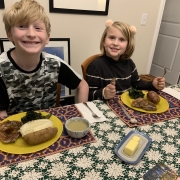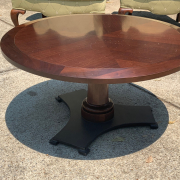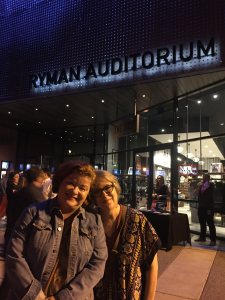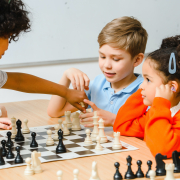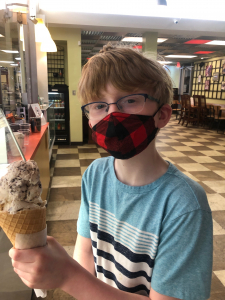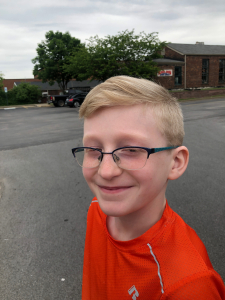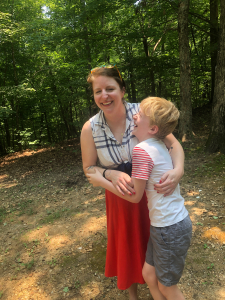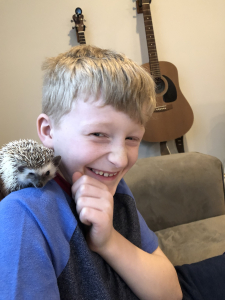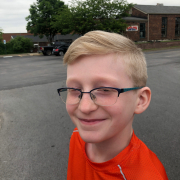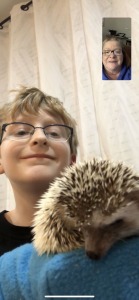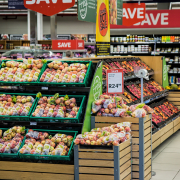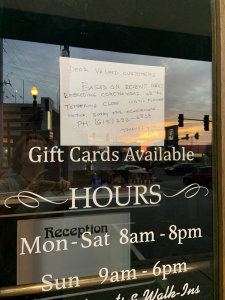Why do siblings fight?
Why does the moon orbit the earth? Why do cats dominate dogs? Why do Kentucky basketball fans loathe the Duke Blue Devils so bitterly?*
Some things represent forces of nature, beyond the influence of humble beings like parents or grandparents. Right, or not?
Buddy turns 11 this week, and Sis will be nine in another month. With their ascent toward adolescence has come a distinctive evolution of fighting styles, a maturation, you might say, toward bust-ups that are more tactical than violent, more reflective of their particular personalities, more calculated and eye-popping in their ugliness.
After a late breakfast with the twosome on a recent overnight visit there was a distinct sour note in the air, the cause yet unknown. Perhaps some fresh air would break the tension. Out we went for a stroll down the hill, my little dog trotting merrily along between Sis and me. Stopping to pick up after him and falling a few steps behind, I heard some low snarling between the two, then watched as Sis shouted “no!” and ran down the hill on her own, leaving her brother behind, a painful scowl on her face that often presages tears.
I caught up to Buddy in a few steps, halted his progress with a grip on the sleeve of his jacket, and stepped in front to face him directly. What did you just say to your sister? I demanded. When he answered, “I told her she has ruined my entire weekend,” my jaw dropped at the easy cruelty of children in general, and the immediate impact on the intended target of this accusation. Of course, it was followed by a litany of all the tiresome and vexing crimes a younger sister may commit, wreaking despicable havoc on life for an older brother.
Should a grandparent dispense discipline? Most I know would surely say no, preferring to leave all that to the parents and play a very different role in the lives of young souls. Over the years I’ve come to agree, but still find the occasional need to draw a line. This was one of those times. I strove for a calm (possibly not in my top five skills) and serious tone. I know you love your sister, I delivered, straight into those blue eyes, but that was a very, very unkind thing to say. Don’t do it again. To his credit, he held eye contact, nodded his head, and whispered, “I’m sorry.”
While it is tempting to conclude that a younger female sibling is at a disadvantage in such situations in perpetuity, years of watching these two has taught me otherwise. Sis’ tactics can and have been as reprehensible as her older brother’s, and every bit as effective in their mission to hurt his feelings, potentially re-arrange his life, maybe even make him vaporize. Each takes a turn in the role of aggressor, each giving about as good (or bad) as they get. No saints, only ordinary sinners, in this particular tale. And as quickly as we may write off sibling arguments as standard stuff, the meanness and hurt feelings is still painful to witness.
Are they really inevitable, or is that an old-school concept that helps me make excuses for these twin lights of my heart? Dr. Sigmund Norr, a Cleveland Clinic pediatrician describes it this way:
“… the majority of fights arise due to underlying causes such as birth order and family dynamics. Competing desires for your attention and differences in developmental stages can lead to moments of jealousy or misunderstanding. Rivalry can even affect them as they get older with their self-esteem and even their friendships. Most of these causes, like age difference or temperament, are impossible to change. That makes sibling rivalry, unfortunately, inevitable.”
Great. Normal, but still treacherous.
When I take a few steps back from the immediacy of these bitter conflagrations, it is interesting to speculate on what they foreshadow about these precocious boneheads as teenagers and adults. Sis fights with intensity and passion, sometimes the first to scratch or deliver a physical blow. Her raison d’etre is defense against any perceived injustice, her task to wave the flag of defiance and never it let touch the ground. There is no subtlety in any cell in her bone marrow, only blazing truth (at least, as she sees it) and often increased volume. “That. Is. NOT OKAY!” she may shout, over and over until someone listens. Buddy’s tactical maneuvering for war is much more subtle, even at his tender age, and calculated. His deceiving calm may belie the dastardly edge of his needling, his worst verbal jabs sometimes aimed at his sister in a deceptively low voice.
When I was a child in a family of four siblings and explosions were as routine as sunrise and breakfast in the morning, my parents often imposed separation as a first solution. After the recent Ruined Weekend argument, I was thus pretty excited to get a Saturday afternoon with Sis on her own. At least they won’t be arguing, I think, and it will be a good chance to catch up with just her. A shopping excursion for art supplies was planned, followed by lunch at a favorite Chinese restaurant. These were known favorites that seemed sure to please.
It turns out, in the irony that so often intertwines our assumptions about children, the old one-on-one was not the blaze of glory I had anticipated. The hot and sour soup bowls and lettuce wraps had barely hit the tabletop when Sis delivered her five-word bombshell. The shock of it deflated my raised right arm, the lettuce wrap choosing that moment to pop open and eject its contents back onto the plate, eluding my mouth, frozen in the open position.
“I wish Buddy was here,” she said with just a hint of affectionate melancholy. And before I could readjust my jaw position, there was more. “Can we take him some lettuce wraps? He really likes those.”
Why? was the only response I could manage. Why do you wish Buddy was here?
“He’s my brother,” came the simple answer, a small shrug implying the presence of the blazing obvious. “Also, he’s really funny.”
That’s true, I agreed, readdressing the lettuce wrap and shaking my head.
Lunch finished, we started homeward, and a short call arrived from her mother. She was checking on us and reporting on Buddy’s birthday gathering with school friends at the local water park, where I was to deliver Sis to join the activities later on. All was going well, though a surprise had emerged. The school friends were daunted by the largest water slide and declined their turns. Buddy knew that his sister had already conquered this monster on an earlier visit. “So, he’s really ready for her to get here,” and ride it with him, confirmed their mom. This bulletin lit up Sis’ face like fireworks on the Fourth.
Driving home, I drifted into memories of ferocious arguments and dastardly plots against my own siblings through our growing up years, three people I grew to cherish and respect as adults more than anyone on the planet, save my parents. This ying and yang should not surprise me, I told myself. Perhaps there is always hope, as long as we as siblings recognize that no matter what, we still need each other. To conquer the water slide, tell a good joke, whatever the journey requires.
Why do cats smack dogs across the face and pull their tails? Cleary, some dynamics in life may not be fully revealed to those of us with eyes to see. We are just meant to watch them unfold, and ride along as best we can.
——————————————————————————————————————————
*The Kentucky-Duke basketball rivalry has a long history, but no highlight was more bitter than a controversial game 30 years ago that eliminated Kentucky from post-season competition and burns in fans’ memories to this day. The Sporting News remembers it like this: “ …Christian Laettner fielding a 70-foot pass from Grant Hill, getting the rhythm just right as the Kentucky defense cleared out for fear of fouling, then launching a 17-foot jumpshot in advance of the buzzer that may be defined as the centerpiece of college basketball’s lore and allure.”
Dammit. I can see it like it was yesterday.

